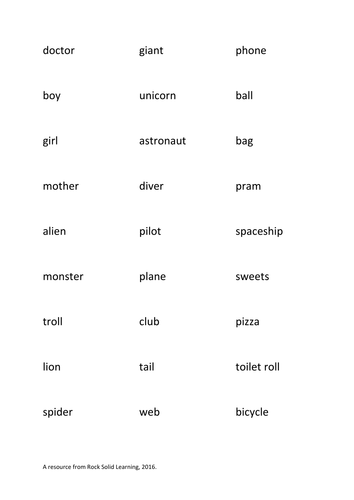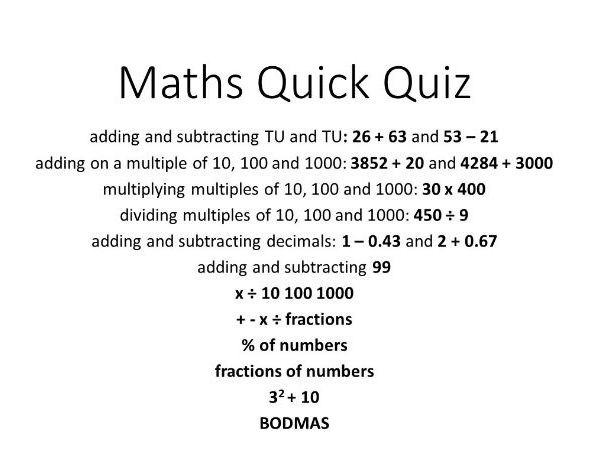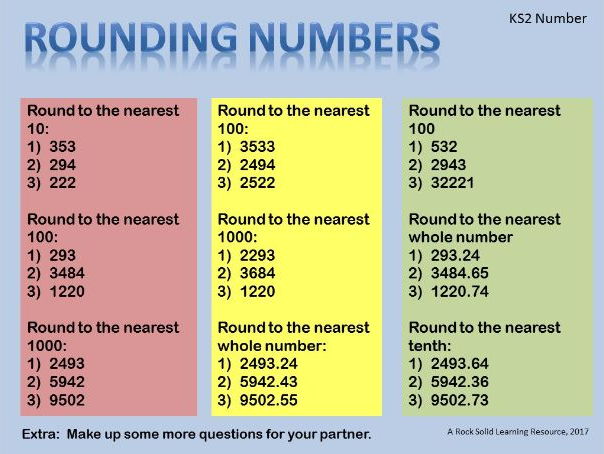46Uploads
38k+Views
15k+Downloads
All resources

Apostrophes for possession / belonging / possessive
Here we have all of the resources for a lesson on possessive apostrophes that assumes some children will know the basics already. It would be good for the first lesson *you* have taught them on it, assuming they have done it sometime last year, or as a revision lesson after a long break.
It starts with the whole class reading an article and spotting missing apostrophes before focusing in on some whiteboard work using pictures as prompts. A partner work/table group game (which could be made competitive or even silly/funny if you like!) is then followed by some written activities to go in the book. Plenary and homework provided too!

Maths SATs Year 6 KS2 Arithmetic Revision Quiz
Use this with a small group or a whole class to revise some of the basic skills on the KS2 SATs Maths Paper 1: Arithmetic.
It is designed to be a quiz quick that more able pupils should be able to do in their heads and less able pupils should be able to do in a reasonable amount of time on a whiteboard. The questions are in a fairly random order, although I have often made 3 or 4 consecutive questions follow the same topic so the children get a chance to practise and get into a topic before the next topic comes along. I have also subtly colour-coded the questions so the teacher can instantly see the level of difficulty: 3 shades of blue, with the lightest representing easier questions and the darker shade representing the hardest questions. (This shading is just a rough idea - you may disagree with paritcular questions and want to change the shade! Also note that the shading is relative within the topic: the hardest of the x1000 questions is still much easier than finding 87% of a number!)
This resource could be used so flexibly as a gap-filler e.g. when you’ve got a spare few minutes at the end of the day or before assembly, as a lesson where you can try questions and then discuss mental methods across the class, or as a competitive quiz with teams or individuals, buzzer rounds and speed rounds. It can be saved for year after year too!
There are approx 200 questions covering the following topics:
adding and subtracting TU and TU: 26 + 63 and 53 – 21
adding on a multiple of 10, 100 and 1000: 3852 + 20 and 4284 + 3000
multiplying multiples of 10, 100 and 1000: 30 x 400
dividing multiples of 10, 100 and 1000: 450 ÷ 9
adding and subtracting decimals: 1 – 0.43 and 2 + 0.67
adding and subtracting 99
x ÷ 10 100 1000
x ÷ fractions
% of numbers
fractions of numbers
32 + 10
BODMAS
Answers included on a separate powerpoint. I have checked them but please let me know if you find any errors so I can amend immediately.

KS2 Maths daily warm ups, starters, mental orals
Suitable for upper KS2, these powerpoints each contain 10 slides: half with questions and half with answers. Each slide has an activity that is differentiated but easily edited to suit your needs. My recommendation would be to let the children choose which colour box to start on and, if they finish ahead of time, they can progress onto the next box.
This resource is ideal for revision of recently covered topics or for 'just keeping things ticking over'.
Week 1: Number
Week 2: Calculation

Homophones (4 activities with increasing difficulty)
Teaching homophones for an entire lesson is pretty hard work and the children get so overloaded with words that they can’t remember them all. So I created four smaller 10-20 minute activities to use as lesson starters or fillers to give children the words in smaller doses.
The first is a powerpoint, which would work best as a whole class with whiteboards. It asks if children know any different spellings for a given word and then uses pictures to support the teacher in giving definitions of the words.
The second is a matching activity (matching homophones to their definitions) that pupils could complete in pairs. These words are trickier and may require the children to use dictionaries.
The third activity is a gap fill, asking the children to choose the right homophone to complete the sentence. Again, dictionaries could be useful.
The final activity asks pupils to write their own sentences to show that they understand the different meanings of homophones. There is a points element that could help make this competitive if that’s the way you class works!
All activities meet NEW homophones; they are not repeated from previous activities.

The Midnight Gang - questions, discussions and activities by chapter
As I read through The Midnight Gang by David Walliams, I jotted down ideas of questions and activities to do with my pupils. Organised by chapter, this powerpoint has over 50 slides with questions that cover all aspects of reading comprehension. Some have short, instant answers and others could be expanded into a 20 minute class discussion. For the creative teacher, there are many ideas and questions that could easily be developed into something exciting and memorable for the children. Some activities have been indicated as potentially cross-curricular, including opportunities for art, geography, science, drama and debate.
My purpose in adding this to TES is to provide teachers with a resource they could use in class with little or no preparation. Other teachers may not want to use it directly with the children but use it as a planning aid for their own lessons.

Boy by Roald Dahl - questions, discussions and activities by chapter
Aimed at upper KS2 or KS3 readers, this resource provides a way to help students engage with the text. With 25 slides (one per chapter), it helps teachers to plan discussions and activities relating to each chapter. Some may be questions you want to ask along the way as you are reading as a class (or alternatively could be modified into comprehension task questions); other activities could be developed into a whole lesson (e.g. a piece of writing or a class debate).
There are a variety of tasks and questions around different topics and reading skills:
formal/informal language
standard/non-standard English
predictions
looking up vocabulary
author’s language choices
structural techniques such as short sentences and use of repetition
building up suspense
author’s awareness of the reader
author’s purpose in writing
This resource also aims to engage pupils in the text through:
drawing characters and settings
comparing what is recorded in the book with their own experiences
generating deeper discussion about schools, traditions and punishments
encouraging students to look up things on the internet: maps, photos, youtube clips






